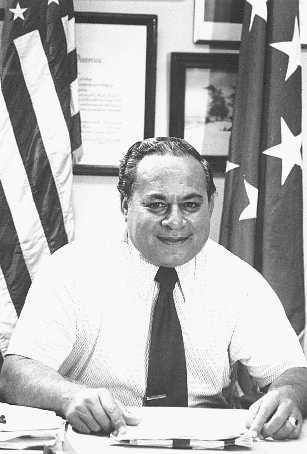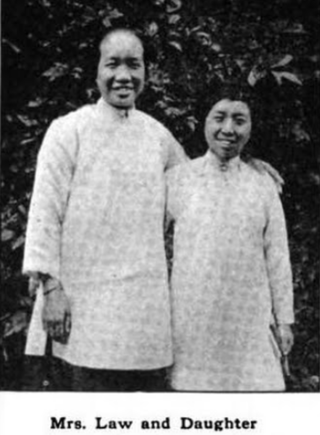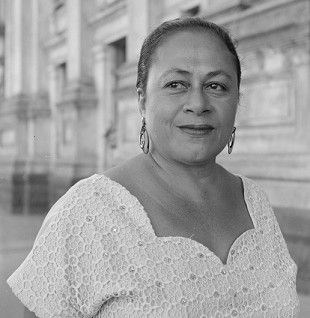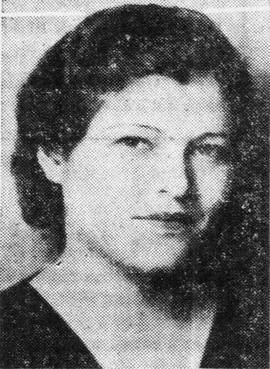Related Research Articles

Peter Tali Coleman was an American Samoan politician and lawyer. Coleman was the first and only person of Samoan descent to be appointed governor of American Samoa between 1956 and 1961 and later became the territory's first and third popularly elected governor from 1978 to 1985 and 1989 to 1993, serving a total of three elected terms. In between, he had served in different administrative positions for Pacific islands.

Muliufi Francis Hannemann is an American politician, businessman, and non-profit executive. He was elected twice as Mayor of Honolulu in 2004 and 2008. Hannemann has served as a special assistant in Washington, D.C., with the Department of the Interior, where he was selected for a White House fellowship in the Reagan administration under Vice President George H. W. Bush. He also served as chairman of the Honolulu City Council. He is the first person of Samoan descent and the second member of the Church of Jesus Christ of Latter-day Saints to serve as Mayor of Honolulu.

American Samoa Community College (ASCC) is a public land-grant community college in the village of Mapusaga, American Samoa. Only legal residents of American Samoa who have graduated from high school or obtained a General Equivalency Diploma are admitted to ASCC.
Samoan Americans are Americans of Samoan origin, including those who emigrated from the United States Territory of American Samoa and immigrants from the Independent State of Samoa to the United States. Samoan Americans are Pacific Islanders in the United States Census, and are the second largest Pacific Islander group in the U.S., after Native Hawaiians.
Ah Jook Ku was an American journalist, writer, media advocate and public relations practitioner. She was the first Asian American reporter for the Associated Press, and the first Asian American female reporter for the Honolulu Star-Bulletin newspaper. Her nickname was "Jookie."

Faoa Aitofele Toese Fiti Sunia, formerly known by the title of Ipulasi Aitofele Sunia, is an American Samoan lawyer and politician. Sunia has served as the eighth lieutenant governor of American Samoa from April 11, 2003 to January 3, 2013.

Sina and the Eel is a myth of origins in Samoan mythology, which explains the origins of the first coconut tree.
Miss Island Queen is a faʻafafine pageant held annually in American Samoa. It is noted for being the longest standing pageant of its kind in the South Pacific. It was first held in 1979 before undergoing a series of changes. No pageant was held in 1980 and 1982 as it endured shifts in ownership and in 2020 and 2022 due to the covid pandemic. It was canceled in 1986 due to a tropical cyclone and failed to take place in both 1999 and 2002 when it struggled with funding. In 1996 It was held simultaneously on the same evening as another faʻafafine pageant Empress of Samoa. In 2008 the pageant coincided with the Festival of Pacific Arts and became the closing event of festivities. After undergoing extensive reestablishment in 2010 the pageant has since been held during Flag Day week and broadcast live on KVZK-2. It is now known as Miss SOFIAS and maintains yearly advocacy and charity programs.
Salu Hunkin-Finau (born ?) is an American Samoan educator, politician, and academic administrator. She is the former president of American Samoa Community College. In February 2012, Hunkin announced her candidacy for Governor of American Samoa in the November 2012 gubernatorial election, becoming the first female candidate for governor since 2000.

Rosalie Compton Kahipuleokalaniahumanu Davison, known as Rose C. Davison, was a part Native Hawaiian female educator, philanthropist and governmental social worker. She served as assistant secretary of the Board of Education of the Territory of Hawaii and represented Hawaii in the 1901 Pan-American Exposition in Buffalo, New York.

Yau Tsit Law (1888-1961) was a Chinese Christian educator, and one of the first Chinese women to graduate from Mount Holyoke College.

Grace Crosby Hamman was an American researcher and government official, focused on the causes of blindness and administration of services for blind people in Hawaii.

Dora Chung Zane was a medical social worker and clubwoman in Hawaii, specializing in services for blind people and children with disabilities.

Joseph Ballard Atherton (1837–1903) was a Honolulu businessman and a former president of Castle & Cooke. He was a member of the Annexation group, which overthrew the Kingdom of Hawaii. He was the founder of Honolulu YMCA. Atherton was a member of both Kalākaua's Privy Council of State and Liliʻuokalani's Privy Council of State.

Mabel Coleman Reid, also known by the Samoan name Sinaitaaga, was an American Samoan politician. In 1953 she was one of the first two women elected to the Fono, when she won a seat in the House of Representatives.

Thelma Alice Kalaokona Moore Akana Harrison was an American public health nurse and politician who served as a Republican Senator for Oahu in the Hawaii Territorial Legislature. She was the first woman to be reelected to the Territorial Senate.

Vivia Belle Appleton was an American physician, specializing in pediatrics. She worked in San Francisco, in France during World War I, in Labrador, in Shanghai, and in Hawaii.
Nora Kawailiula Stewart Coleman was an American public figure who served as the First Lady of American Samoa for four tenures spanning five decades. Coleman first became first lady of American Samoa from 1956 to 1961 when her husband, Peter Tali Coleman, was appointed the civilian governor of the U.S. territory. She returned to the role of first lady in 1978 after Peter Tali Coleman became the first popularly elected Governor of American Samoa. Coleman later served as first lady once again from 1989 to 1993 during her husband's final term as governor.
Jeannette Marie Mageo was an American psychological anthropologist at Washington State University. She was known for her anthropological work that focused on dreams and the self, attachment and childhood, gender and sexuality.
References
- 1 2 3 4 5 6 7 8 9 10 11 Simon-McWilliams, Ethel; Green, Karen Reed (1987). Glimpses into Pacific Lives: Some Outstanding Women (PDF). Portland, Oregon: Northwest Regional Educational Lab.
- 1 2 3 4 Wiley, Bonnie (1979-10-21). "With 5 new buildings, community college in Samoa moves forward". Honolulu Star-Bulletin. p. 33.
- ↑ "Scanlan, Saeu Leau". WorldCat. Retrieved 2021-01-11.
- ↑ Education Directory: Colleges & universities. U.S. Government Printing Office. 1976.
- ↑ Annual Report. Office of Samoan Information. 1980.
- ↑ Carter, John (1981). Pacific Islands Yearbook, 1981. Pacific Publications Pty, Limited. ISBN 978-0-85807-049-3.
- ↑ Iyechad, Gwenda L. (1992-03-11). "Samoan culture in a quandary". Honolulu Star-Bulletin. p. 6.
- ↑ Mageo, Jeannette Marie (1996). "Hairdos and don'ts: Hair symbolism and sexual history in Samoa". Frontiers. 17 (2): 138–167. doi:10.2307/3346607. JSTOR 3346607.
- ↑ Mageo, Jeannette Marie (1998). Theorizing Self in Samoa: Emotions, Genders, and Sexualities. University of Michigan Press. ISBN 978-0-472-10920-3.
- ↑ "Territory Loses Selfless Businessman". Talanei. 2016-09-29. Retrieved 2022-01-11.
- ↑ "Fanene Morris Scanlan passes away at 82". Samoa News. 2018-05-29. Retrieved 2022-01-11.